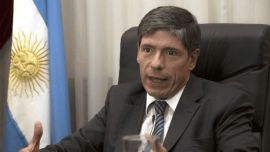Argentina has entered unknown political territory with the triumph of the “first liberal-libertarian president in the history of humanity,” as Javier Milei said in his victory speech. So what led Argentines to massively back a political option built in just two years?
With the promise of toppling the status quo, the 53-year-old ultra-liberal – who had become popular as an eccentric television panellist – first attracted young men. It was the close of a decade that had witnessed the birth of the Ni Una Menos movement against gender violence and femicide, the fight for abortion or the questioning of traditional masculinity.
His appeal was explained by “the promise that his iconoclastic style indicated a radically new approach to leadership,” said Benjamín Gedan, from the Wilson Center in Washington DC.
However, throughout his campaign, Milei attracted an increasingly wider electorate which also longed for renewal and radical change.
The 55 percent of the votes he won against his rival, Peronist Economy Minister Sergio Massa (44 percent), “had nothing to do with Milei’s historic vote,” said political analyst Carlos Germano.
This time, “it was a cross-sectional cut in terms of age, socioeconomic level and gender,” the expert added.
With his belligerent style, Milei rang out loudly in an electorate vehemently rejecting Kirchnerism, the space of the current vice-president and two-time former president Cristina Fernández de Kirchner. The veteran politician, who has been convicted of corruption but does not have a firm sentence, has dominated Argentine politics over the last 20 years, except in the four-year interval when right-wing conservative Mauricio Macri governed (2015-2019).
“Between continuity and risk, society chose the latter,” said Rosendo Fraga, an experienced political analyst and the director of the Unión para la Nueva Mayoría think-tank.
The rejection of traditional leaders, and Kirchnerism in particular, was exemplified by the slogans chanted by Milei's supporters on election night, including “the caste is afraid” and “Cristina’s afraid.”
It was a feeling shared by Oscar Sario, a 68-year-old pensioner who said “it was proven, that most Argentines want change."
"He was voted for by many people who perhaps do not agree with him so much, but who do want change," said the retiree.
For this reason, Milei’s victory “has to do with the decadence of Argentine political leaders, which was increasingly inbred and struggled a lot to see the concerns of an exhausted society who could not plan for the future,” Germano explained.
For Massa, convincing Argentines that he would tidy up the economy was an uphill battle, given that he has been the economy minister in charge of a country with inflation at 143 percent per annum and a poverty rate exceeding 40 percent.
“The electorate did not forgive the government for the economic and social failure,” concluded Fraga.
According to Gedan, voters were less attracted to Milei than repelled by Massa, with Argentina's “protest vote” won by a landslide.
"Milei gave a voice to the blind rage in Argentina towards a political system which has generated a seemingly endless series of crises, imposing economic difficulties and constant inflation on the population,” explained the Latin American expert.
Milei was considered by many to be an unlikely winner until, after the first round vote in October, former president Macri backed him with his coalition's candidate, Patricia Bullrich, granting the libertarian an institutional halo.
That support gave Milei “greater consistency, greater political volume,” agreed Germano.
Macri himself made an effort to make the figure of the libertarian more presentable. “There are things he proposes which are extreme,” he stated in a talk last week at the Wilson Center. “And he will have to negotiate in Congress because he doesn’t have enough votes ... he poses no danger."
Milei became known as a television panellist and clips of his enraged interventions have circulated widely on social networks, reaching millions of young people.
He conducted much of his campaign on Twitter, Instagram and TikTok, further distancing himself from traditional formats and shaking up the campaign.
“It was a struggle between the old way to communicate in traditional media and billboards, with state funds, against a more organic way to communicate via new media,” observed analyst Ana Iparraguirre, from the GBAO Strategies think tank.
– TIMES/AFP




















Comments